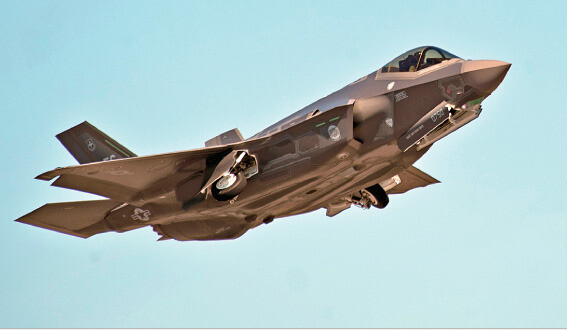hankyoreh
Links to other country sites 다른 나라 사이트 링크
Were S. Korean purchases of weaponry meant to quiet US objection to OPCON postponement?

By Park Hyun, Washington correspondent
The South Korean government’s decision this year to purchase the F-35 and other state-of-the-art US weaponry has gone some way in softening the US Congress’s objections to another postponement in the transfer of wartime operational control (OPCON), US congressional sources said.
A final agreement on the date and conditions for another postponement is expected to be made at the ROK-US Security Consultative Meeting (SCM) scheduled to take place in Washington on Oct. 23. Congress, which holds heavy sway over the administration’s foreign affairs and security policy decisions, was strongly opposed to another postponement when Seoul first proposed it in mid-2013. Now, congressional sources are saying it has softened its position and plans to respect the Barack Obama‘s administration decision on the matter.
An aide to John McCain, a Republican on the Senate Armed Services Committee and congressional heavyweight, told the Hankyoreh’s Washington correspondent that Congress was “waiting for the results of the South Korean and US defense authorities‘ discussions.”
“Congress is open now to what the Obama administration decides,” the aide added.
While Congress’s approval isn’t essential for the OPCON transfer, it does approve the defense budget and related projects with its yearly passage of the National Defense Authorization Act, meaning that strong enough opposition from it could block another transfer postponement.
“A lot of the opposition in Congress to another postponement died down when the South Korean administration decided to purchase state-of-the-art US weaponry this year,” said another congressional source on condition of anonymity. In particular, the source singled out the decision to purchase the F-35 and Global Hawk.
The claims aren’t clear-cut evidence that Seoul’s weapons purchases were tied directly to the postponement issue. But they do show that the move went on a long way in terms of quieting objections from the White House and Capitol. Given Congress’s susceptibility to lobbying from the US defense industry, some analysts are saying the turnaround may definitely have been influenced by Seoul’s large-scale weapon purchase decision.
Besides the F-35 and Global Hawk, Seoul also made a final decision to purchase the Patriot Advanced Capability-3 (PAC-3) missile this year. The projects had been on ice for several years before a conclusion was reached - just after Seoul’s request for another OPCON transfer postponement. The F-35 purchase is expected to cost 7.34 trillion won (US$6.9 billion), while the Global Hawk and PAC-3 are expected to run 885 billion won (US$832.3 million) and 1.4 trillion won (US$1.32 billion) respectively.
Another reason for Seoul‘s suddenly proactive attitude on the weapons purchases may have been US criticisms of the postponement request, which many are taking as a sign that South Korea relies too much on the US for security and has no plans to improve its own defense capabilities.
An Oct. 9 article on OPCON in the military newspaper Stars and Stripes noted that critics “have complained that Seoul, knowing Washington won’t force the transfer, hasn’t spent the money on upgrades to its military that would make it capable of leading a warfight.”
“Critics worry that South Korea does not yet have the advanced intelligence, surveillance, missile defense and other capabilities it would need to seamlessly interoperate with and lead a warfight with the U.S.,” the article continued.
Congress has already been demanding a greater share of security costs from its allies, as financial constraints compel defense budget cuts. During a July 2013 confirmation hearing for Curtis Scaparotti, then a nominee (since confirmed) for USFK Commander, Senate Armed Services Committee chairman Carl Levin said it was “important that we see to it that the primary responsibility for defending South Korea during a time of war lies with South Korea.”
“It is a sovereign nation, and sovereign nations should be responsible for their own national defense in time of war,” Levin also said at the hearing.
Please direct questions or comments to [english@hani.co.kr]

Editorial・opinion
![[Column] Park Geun-hye déjà vu in Yoon Suk-yeol [Column] Park Geun-hye déjà vu in Yoon Suk-yeol](https://flexible.img.hani.co.kr/flexible/normal/500/300/imgdb/original/2024/0424/651713945113788.jpg) [Column] Park Geun-hye déjà vu in Yoon Suk-yeol
[Column] Park Geun-hye déjà vu in Yoon Suk-yeol![[Editorial] New weight of N. Korea’s nuclear threats makes dialogue all the more urgent [Editorial] New weight of N. Korea’s nuclear threats makes dialogue all the more urgent](https://flexible.img.hani.co.kr/flexible/normal/500/300/imgdb/original/2024/0424/7317139454662664.jpg) [Editorial] New weight of N. Korea’s nuclear threats makes dialogue all the more urgent
[Editorial] New weight of N. Korea’s nuclear threats makes dialogue all the more urgent- [Guest essay] The real reason Korea’s new right wants to dub Rhee a founding father
- [Column] ‘Choson’: Is it time we start referring to N. Korea in its own terms?
- [Editorial] Japan’s rewriting of history with Korea has gone too far
- [Column] The president’s questionable capacity for dialogue
- [Column] Are chaebol firms just pizza pies for families to divvy up as they please?
- [Column] Has Korea, too, crossed the Rubicon on China?
- [Correspondent’s column] In Japan’s alliance with US, echoes of its past alliances with UK
- [Editorial] Does Yoon think the Korean public is wrong?
Most viewed articles
- 1‘We must say no’: Seoul defense chief on Korean, USFK involvement in hypothetical Taiwan crisis
- 2Will NewJeans end up collateral damage in internal feud at K-pop juggernaut Hybe?
- 3[Column] Park Geun-hye déjà vu in Yoon Suk-yeol
- 4Why Korea shouldn’t welcome Japan’s newly beefed up defense cooperation with US
- 5Thursday to mark start of resignations by senior doctors amid standoff with government
- 6N. Korean hackers breached 10 defense contractors in South for months, police say
- 7[Guest essay] The real reason Korea’s new right wants to dub Rhee a founding father
- 8[Column] ‘Choson’: Is it time we start referring to N. Korea in its own terms?
- 9Kim Jong-un expressed ‘satisfaction’ with nuclear counterstrike drill directed at South
- 10[Editorial] New weight of N. Korea’s nuclear threats makes dialogue all the more urgent